Clifford Garstang's Blog, page 2
June 2, 2025
I’ve Got Questions for Tim Weed
Editor’s Note: This exchange is part of a series of brief interviews with emerging writers of recent or forthcoming books. If you enjoyed it, please visit other interviews in the I’ve Got Questions feature.
 The Afterlife Project by Tim WeedWhat’s the title of your book? Fiction? Nonfiction? Poetry? Who is the publisher and what’s the publication date?
The Afterlife Project by Tim WeedWhat’s the title of your book? Fiction? Nonfiction? Poetry? Who is the publisher and what’s the publication date?THE AFTERLIFE PROJECT: a novel; Podium Publishing | June 3, 2025
In a couple of sentences, what’s the book about?With humanity facing imminent extinction, a team of scientists uses technology originally designed for interstellar travel to send a test subject ten millennia into Earth’s future. Marooned in an uninhabited wilderness, microbiologist Nicholas Hindman searches in vain for remnants of the human race. Meanwhile, back in 2068 A.D., the team’s head physicist and its doctor lead a small crew of survivors on a sailing voyage to a small volcanic island north of Sicily on a harrowing quest to save the future.
What’s the book’s genre (for fiction and nonfiction) or primary style (for poetry)?The Afterlife Project, a finalist for the 2023 Prism Prize for Climate Literature, is a work of literary speculative fiction. That said, it also fits in the genres of science fiction and eco-fiction.
What’s the nicest thing anyone has said about the book so far?“A fascinating tale that is difficult to put down; dire ecological challenges and imaginative future discovery combine in this very engrossing read.“— Library Journal, starred review
What book or books is yours comparable to or a cross between? [Is your book like Moby Dick or maybe it’s more like Frankenstein meets Peter Pan?]Station Eleven meets The Overstory, or maybe The Road meets Cloud Atlas.
Why this book? Why now?Fiction, more than any other art form, enables a reader to experience the world from within a consciousness that’s not their own. Imagining alternative lives and alternative futures—sometimes very dark ones—from the relative safety and comfort of the bedside or a favorite reading chair, putting ourselves in the position of fictional characters as they confront tense and difficult challenges, and then processing those experiences and the emotions they evoke into wisdom or at least working theories about life, is a cathartic, healthy, and uniquely human practice.
I suppose part of what I was trying to do in the book was to create an immersive adventure story about a future where the survival of the entire species is in doubt, in order to explore how that might feel emotionally.
My hope is that the novel offers both a cautionary note about the multi-pronged environmental crisis we’re currently facing—a reminder that humanity needs to take action now in order to avoid the worst outcomes— and a kind of optimistic prediction about nature’s capacity for healing, at least in the deep future time-frame.
Other than writing this book, what’s the best job you’ve ever had?Probably as a “featured expert” (traveling lecturer) for National Geographic Expeditions. I got to travel to some pretty cool places and do some pretty cool things. In fact it was in this role, on a small-ship cruise through Tierra del Fuego— Ushuaia, Argentina, Cape Horn, Beagle Channel, Straits of Magellan to Puntarenas, Chile, with zodiac landings at glaciers, sub-Antarctic forests, penguin colonies—that I received the initial inspiration for The Afterlife Project.
What do you want readers to take away from the book?If there’s one piece of wisdom I would wish for readers to take away from reading it, it’s that we’re not facing the end of the amazing, ever-evolving panoply of life on Earth. Far from it. Rather we are—or should be—facing the end of the illusion that the human species is not part of nature. That we haven’t from our very emergence as a species been embedded in the ebb and flow of this complex and beautiful 4.5 billion year-old planet. This would be a timely and necessary paradigm shift. Because it’s still not too late to save ourselves.
What food and/or music do you associate with the book?Food: Foraged foods like fish, venison, wild onions, ramps, nuts and berries, various invertebrates, mushroom elixirs, and “lab jerky” (a soy-based post-apocalyptic staple for my questing scientists)
Music: Gregorian chants, Bach, the Grateful Dead, and all the other musical treasures that were permanently lost with the collapse of the human species.
What book(s) are you reading currently?Burn, Peter Heller. I treasure his novels and have been so honored that he’s among the authors that blurbed The Afterlife Project
 Tim Weed
Tim WeedLearn more about Tim on his website.
Follow him at BlueSky and Threads.
Buy the book from the publisher (Podium Publishing) or Bookshop.org.
May 31, 2025
2025 Reading–May
Pure America: Eugenics and the Making of Modern Virginia by Elizabeth Catte was my book club’s selection for May. Although the accounts of the victims of the eugenics movement were moving, I didn’t think the author’s insertion of her opinions on some matters to be appropriate, and those opinions detracted from the overall impact of the book for me. It also seemed as though there were significant omissions, and limiting the discussion to Virginia weakened the argument.
The Hunter by Tana French is the second in the author’s series about a Chicago cop who has moved to a village in Ireland. I didn’t love the first in the series, but other people did, so I thought I’d give #2 a try. I think I’m done now. I didn’t hate it, but the main character, the cop, doesn’t do much for me. And most of the people in the village are awful, so I don’t think I’d stay. (He does have a love interest now, but I bet she’d leave if he asked her to come with him.) The story includes a mystery, of course, but the resolution isn’t satisfying, in my view.
The Bird Hotel by Joyce Maynard is a novel set primarily in a fictional Central American country. The main character, Irene, had her life upended when her hippie-ish mother was killed in a Weather Underground explosion in Manhattan. Living a secret life with her grandmother and never feeling rooted, she eventually finds herself running a small hotel. While the protagonist is charming and likeable, the novel consists of many episodes of visitors to the hotel. While there is a plot—she struggles to hang on to the place—there’s a lot of filler that, while pleasant, doesn’t move the story forward.
The Mexican Messiah: A Novella & Stories by Jay Kauffmann is a breathless ride into a spiritual landscape. Reminiscent of Cormac McCarthy, the haunting title novella will move you as much by what is left out as what is included, as the trajectories of its central characters launch and collide. And the accompanying short stories render tightly focused portraits of men and their complex relationships in far flung locales—Europe, North Africa, East Asia. Jay Kauffmann has given us a collection of rich narratives that attempt to answer unanswerable questions about love and, especially, loss. (I blurbed this book and also had the pleasure of interviewing the author as part of his book launch.)
Broken-Heart Syndrome by Anne Colwell is a book I was asked to blurb: “Through all the heartbreak and loss, the mistakes and disappointments, I was cheering for every last one of the characters in Anne Colwell’s debut story collection, Broken-Heart Syndrome,to make it. Doctors and nurses, patients and their loved ones, all are drawn with such care that they truly come alive on the page. The hospital around which these stories revolve is fertile ground for the dramatic, and Colwell lets her tales unfold with rare compassion and honesty. It’s a big cast of characters, but I fell in love with them all.”
Shadows in the Pleasure Gardens by Elaine Mary Griffin is an engaging mystery set in the early 19th Century featuring Chester Carter, a charming young bank apprentice who finds himself embroiled in a small-town scandal when he witnesses a robbery at his bank. Despite pressures from every corner, Chester strives to do the right thing, even while looking out for his own interests. Horse lovers will appreciate Fisheye, Chester’s enthusiastic racehorse companion, who does his best to help.
May 5, 2025
I’ve Got Questions for Ross Hightower and Deb Heim
Editor’s Note: This exchange is part of a series of brief interviews with emerging writers of recent or forthcoming books. If you enjoyed it, please visit other interviews in the I’ve Got Questions feature.
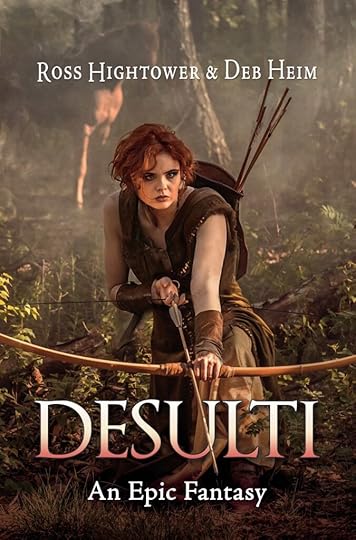 What’s the title of your book? Fiction? Nonfiction? Poetry? Who is the publisher and what’s the publication date?
What’s the title of your book? Fiction? Nonfiction? Poetry? Who is the publisher and what’s the publication date?Desulti is fiction. It was published in September 2024 by Black Rose Writing.
In a couple of sentences, what’s the book about?“Bad-ass epic feminist fantasy.” It’s about a woman who has the courage to confront the corrosive effects of bigotry. A powerful exploration of women’s rights and the fight for independence
What’s the book’s genre (for fiction and nonfiction) or primary style (for poetry)?It’s high fantasy.
What’s the nicest thing anyone has said about the book so far?Our books emphasize emotions and relationships more than many fantasy novels, so when I read the following in the review by Reedsy Discover, I knew the reviewer really got the story: “Tove is an incredibly charismatic character who is a joy to follow through her trials and tribulations and the romance that builds between her and another Desulti is one of the sweetest and most natural relationships that I have read in recent years.”
What book or books is yours comparable to or a cross between? [Is your book like Moby Dick or maybe it’s more like Frankenstein meets Peter Pan?]Two that have similar themes that I read recently are She Who Became the Sun by Shelly Parker-Chan and The Jasmine Throne by Tasha Suri
Why this book? Why now?We write the Spirit Song: Rebels Rising series together. The series tells the story of how a peaceful people learn to fight back against imperial oppressors. This is the second book in the series. The prequel books focus on individual characters who are pivotal to putting everything in place for the rebellion that erupts in the Spirit Song main series.
Other than writing this book, what’s the best job you’ve ever had?Ross: I managed a center while a faculty member at the University of Wisconsin-Milwaukee. We hosted software in our data center which was used by faculty and students all over the world. It was really like running a million-dollar business. It was the most stressful job I ever had. The reason for my white hair. But I loved the technical challenges and the many unique people who passed through my life.
Deb: My current job is the best job I’ve ever had, which makes retiring bittersweet. I’m a public health nurse consultant with the state of Wisconsin and I help local public health nurses keep their communities healthy. But the job that suited me best was a nutrition professor at a community college. The kids were often first-generation college students. They worked so hard and appreciated anything I could do to help them succeed.
What do you want readers to take away from the book?There are several themes: It’s important to stand up to people who would diminish you because of the circumstances of your birth. The power of storytelling to expand your idea of what’s possible and to build community. Oppressed people finding they have more in common with each other than with the forces that oppress them.
What food and/or music do you associate with the book?Food, music and dancing are central to the story because of the way they can bring people together. Beer for sure, because taverns play a role in all of the books (and we often write at our local brewery). Festivals as celebration of community are also integral to the stories, which include music, storytelling and food. We describe an Alle’oss boar stew (which Deb has made a passable version of) and “handpies”, which we really need to make. While I write, I hear the music as Irish or Bluegrass. The music usually involves instruments you can carry with you, such as bodhrains, lutes and fiddles.
What book(s) are you reading currently?Ross: I have several books going, but I’ve just finished one of the best books I’ve read in a long time; We Begin at the End by Chris Whitaker.
Deb: The book I most enjoyed recently was Nettle & Bone by T. Kingfisher.
 Ross Hightower and Deb Heim
Ross Hightower and Deb HeimLearn more about Ross and Deb on their website.
Follow Ross and Deb on Facebook.
Buy the book from the publisher (Black Rose Writing), Amazon, or Bookshop.org.
May 1, 2025
2025 Reading–April

Martyr! by Kaveh Akbar is a novel about a young Iranian man who comes to America as a child, as Akbar did. The man, Cyrus, enrolled at Keady University in Indiana, which I found hilarious. Akbar went to Purdue University and Gene Keady was at one time the basketball coach at Purdue. Cyrus is in recovery, struggling to deal even after many years, with his mother’s death in an Iranian jet that was shot down by U.S. forces. He’s writing a book he calls The Book of Martyrs and he is obsessed with an Iranian artist who is appearing in her own installation at the Brooklyn Museum. The language of the book is great and maybe at times a little too clever, and the book is more about what Cyrus realizes than what he actually does. I listened to the audiobook and the narrator was fantastic.
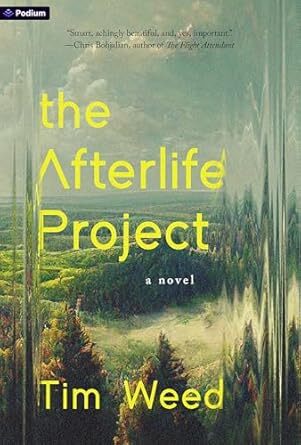
The Afterlife Project by Tim Weed is a terrific science fiction novel. In the near future, scientists are dealing with the aftermath of a “hyperpandemic” that has decimated the human population and left most of the rest infertile, compounded by the effects of irreversible climate change. When it appears likely that the human race will be wiped out, a plan to send fertile specimens to another planet emerges, but that is shifted for technical reasons to one that will put them in suspended animation for 10,000 years, in hopes that they can repopulate the planet then and avoid the mistakes. The book is in two timelines, one in the near future searching for a fertile female, and one in the distant future with one of the scientists, a fertile male, looking for signs of human survivors. This was a really enjoyable read, due out in June, but I received an ARC.
Elon Musk by Walter Isaacson is a biography of the world’s richest man. At 600 pages, it’s a slog, and I wasn’t interested much in all the different companies and technical details of the products in Musk’s portfolio. What I was interested in was what a shitty person he is to the people in his life, including wives, colleagues, and employees.

The Shattering: America in the 1960s by Kevin Boyle was my book club’s selection for April. While most of the members of my book club grew up in the 60s, so we were aware of the events the book describes, it was great to read about them all in one place and to see how they were all connected. I was keen to read this book after I met the author and heard him give a talk at a bookstore in Galway, Ireland last year.
April 28, 2025
I’ve Got Questions for Suzanne Groves
Editor’s Note: This exchange is part of a series of brief interviews with emerging writers of recent or forthcoming books. If you enjoyed it, please visit other interviews in the I’ve Got Questions feature.
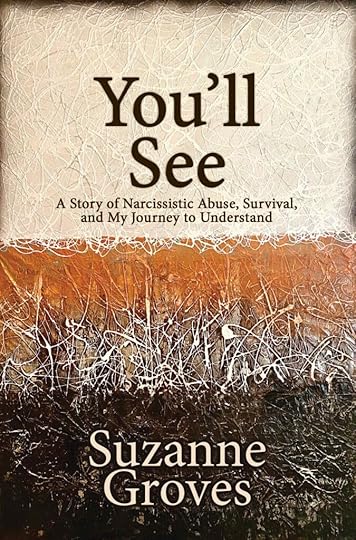 You’ll See by Suzanne GrovesWhat’s the title of your book? Fiction? Nonfiction? Poetry? Who is the publisher and what’s the publication date?
You’ll See by Suzanne GrovesWhat’s the title of your book? Fiction? Nonfiction? Poetry? Who is the publisher and what’s the publication date?You’ll See: A Story of Narcissistic Abuse, Survival, and My Journey to Understand is my memoir published by Black Rose Writing in April 2024.
In a couple of sentences, what’s the book about?You’ll See is a book about the 56 years I spent doing all I could to win love, approval and praise from my father who, I ultimately figured out, was a malignant narcissist (as if there’s any other kind) who thrived on wielding power and control over others, including and especially his own family. No matter how much I achieved or accomplished, my father ensured I would never feel “good enough.” Nearly four years since his death, I still struggle with the emotional scars from his narcissistic abuse.
What’s the book’s genre (for fiction and nonfiction) or primary style (for poetry)?Memoir
What’s the nicest thing anyone has said about the book so far?One reviewer wrote: “This memoir isn’t just a book. It’s a companion. A mirror. A map. A lifeline. For anyone who’s endured the silent devastation of narcissistic abuse, You’ll See doesn’t just say ‘I understand.’ It says, ‘You’re not alone.’”
What book or books is yours comparable to or a cross between? [Is your book like Moby Dick or maybe it’s more like Frankenstein meets Peter Pan?]While the memoir topics are vastly different, I compare my memoir (with humility) to Educated by Tara Westover and The Glass Castle by Jeanette Walls…both raw and poignant memoirs about dysfunctional families and finding a way to carve one’s hopeful future from the wreckage of their abuse.
Why this book? Why now?I began writing my book shortly after both of my parents died – within two months of one another. I was trying to make sense of all I had experienced with my father and, to a degree, my mother, and the only way I could do it was to pour everything onto paper…I guess, it was my way of trying to determine if I was crazy, or if these things really happened to me. With every remembered vignette I described, I began to see a pattern that my therapist helped me understand was my father’s narcissistic personality disorder.
I want to normalize discussions about narcissistic abuse, among other things, so those of us who were manipulated to believe false narratives can actually rehabilitate ourselves and recover…eventually.
Other than writing this book, what’s the best job you’ve ever had?My best job was the nine-plus years I spent serving as the Executive Director of Communications, Public Relations and Marketing for a six-campus community college.
What do you want readers to take away from the book?I think the key takeaway I tried to impart in my memoir is that narcissistic abuse is insidious…the narcissist will make you think YOU’RE the one with the problem and over time, you become scarred with feelings of inadequacy, worthlessness, and longing for a relationship you’ll never be able to fix. Being able to give voice to these feelings, telling your stories to someone you trust, is absolutely the first step to taking charge of your life and defining boundaries to protect yourself. Resilience comes at a high price because it means you had to suffer along the way, but it also means you survived it, and that’s what counts.
What food and/or music do you associate with the book?A full-bodied Merlot and Stevie Ray Vaughan.
What book(s) are you reading currently?As a facilitator of a critique group with fellow published authors, I’m reading brilliant works in progress by Cliff Garstang, Ross Hightower, Del Blackwater, Kat Fieler and Karen Osborne, all of whom humble me with the caliber of their talents.
 Suzanne Groves
Suzanne GrovesLearn more about Suzanne on her website.
Follow her on Facebook.
Buy the book from the publisher (Black Rose Writing), Amazon, Barnes & Noble, or Bookshop.org.
April 22, 2025
I’ve Got Questions for Del Blackwater
Editor’s Note: This exchange is part of a series of brief interviews with emerging writers of recent or forthcoming books. If you enjoyed it, please visit other interviews in the I’ve Got Questions feature.
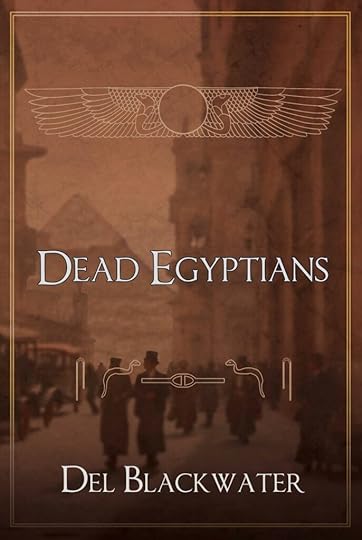 Dead Egyptians by Del BlackwaterWhat’s the title of your book? Fiction? Nonfiction? Poetry? Who is the publisher and what’s the publication date?
Dead Egyptians by Del BlackwaterWhat’s the title of your book? Fiction? Nonfiction? Poetry? Who is the publisher and what’s the publication date?Dead Egyptians is the first of seven books in my historical fantasy series (also called Dead Egyptians). It came out in August of 2024 through Black Rose Writing!
In a couple of sentences, what’s the book about?Dead Egyptians contains the seeds for two conflicts, both of which will take seven books to fully resolve. The first is Egypt’s conflict – they have been under foreign rule for over 2,000 years in 1902 when the story opens, and revolution is on the horizon. The second is my protagonist’s conflict – Albion Stanley has a lot going for him, but until he passes seven spiritual trials, he will be trapped in a reincarnation cycle. Which might be frustrating for the dead Egyptians to watch – they want him to pass these trials so that he can be like them. There is, of course, a love story to keep you entertained while I get the reader through all of the history and spirituality.
What’s the book’s genre (for fiction and nonfiction) or primary style (for poetry)?Historical fantasy. The protagonist is queer, but it was written as proper fantasy that should appeal to anyone who loves fantasy, or Egypt, or magical thinking.
What’s the nicest thing anyone has said about the book so far?Many readers have said marvelous things. One of the passive-aggressive reviews I got, which is ultimately very flattering, was something along the lines of, “In the hands of another writer, this would be a garbled mess, but in the capable pen of Del Blackwater, it actually works.” I believe this is a reference to the fact that I write about modern Egypt and Ancient Egypt simultaneously. The two Egypts could be at odds, but they aren’t. They’re both the real Egypt, if you will.
What book or books is yours comparable to or a cross between? [Is your book like Moby Dick or maybe it’s more like Frankenstein meets Peter Pan?]My book is a cross between E.M. Forster’s Maurice and Joan Grant’s Winged Pharaoh. Two books that have nothing in common, but without which, Dead Egyptians could not exist. Maurice came into my world first – I saw the Merchant Ivory movie in the 90s, and it immediately became one of my top three films of all time. When I graduated to the book, I was in tears because the language was so beautiful, and also because it’s the first time in literature when a gay couple was not depicted as doomed, or tragic, or perverse.
Winged Pharaoh came into my life in a very magical way. I had read all of the academic materials about Ancient Egypt, and I still felt really unsatisfied. I knew I had not yet found the thing I was looking for – I wanted to know what the priests and priestesses actually learned in the temples. Winged Pharaoh was on its side in a bookstore, I picked it up largely just to re-shelve it, and nothing was ever the same again. It is a past life account from a woman who claimed to remember her life in the Old Kingdom, where she did train in the temples. It really shocked me to my core, because it lined up perfectly with established history, which would not have been easy to do in the 1930s when the book came out. Egyptology was still incredibly inaccurate at the time. But her story has survived, and should be talked about, whether or not you believe her story.
Why this book? Why now?I was very physically unwell when I began to write this book, which was about ten years ago now. I felt that the moment had come to say what I had to say. It turns out the things I have to say are variations of, ‘Egypt matters’ and ‘Being a good person doesn’t mean living like a monk. You can enjoy life and still be a moral person.’ Which, incidentally, is a very Egyptian concept – both ancient and modern Egyptians excel at living well while also holding things sacred. They never sacrifice one for the other.
Other than writing this book, what’s the best job you’ve ever had?I am blessed to work in Information Technology in state government. The blessings have been many, and it was this position that allowed me to afford five research trips to Egypt. I knew as soon as I started my current position that I was one of the lucky ones.
What do you want readers to take away from the book?There is treasure in Egypt, and it’s not the treasure. It’s the knowledge.
What food and/or music do you associate with the book?Funny. This book pairs well with the band Cigarettes After Sex and/or Depeche Mode, depending on whether you’re in the sweet parts or the dark parts.
What book(s) are you reading currently?I am reading Wordsworth in Bogota by Scott Sundby, which just came out recently and is a delightfully absurd comedy that takes the reader to some very unexpected places. The word choices are unpredictable and stunning.
I am also reading Pebble in the Pond by Suzanne Groves, which has not yet been released, and is a delightful Southern tale. Not Southern Gothic, more like a Steel Magnolias type story where human psychology and relationships take center stage. I laugh out loud all the time, and I feel like I know these women. It does have a touch of tragedy to it as well. You can’t have one without the other in Stuart’s Landing.
 Del Blackwater
Del BlackwaterLearn more about Del on her website.
Follow her on Facebook and Instagram.
Buy the book from the publisher (Black Rose Writing), Amazon.com, or Bookshop.org.
April 17, 2025
Book Fairs, Book Clubs, and Artists’ Residencies
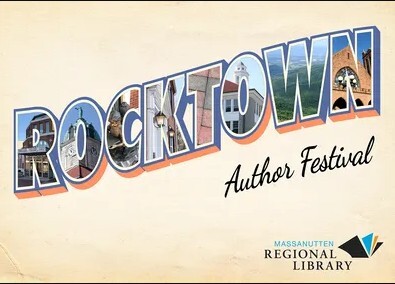
This past weekend, I participated in the fifth annual Rocktown Author Festival hosted by the Massanutten Regional Library in Harrisonburg, Virginia. The library does an excellent job with this event, providing snacks and lunch for the authors as well as inviting some of the authors to present panel discussions. This year, close to 40 authors participated in the festival.
Well-run or not, I have mixed feelings about book fairs like this. I’ve done three in the past year—two in libraries and one hosted by a local bookstore—and honestly, as an introvert, I think I’d rather spend my Saturdays doing something else. I like writing, but I didn’t start writing books in order to hand-sell them.
I do like talking to potential readers, however, although giving the same spiel over and over again for five hours isn’t much fun. I had copies of five of my six books with me on this occasion, and when visitors asked me about my books, I did the full rundown, with an “elevator pitch” for each one, hoping that one would strike a chord that would lead the visitor to buy something.
Also, literary fiction stands out like a sore thumb at an event like this, but there’s a wide selection of genre writing—fantasy romance, horror, mystery, thriller. People would come to my table, look at my books, and not be able to discern what genre they were. If I said “literary fiction,” some people’s eyes would glaze over, so I usually asked them what they liked to read and I would try to find a connection between their interests and my books.
Still, I probably should have stayed home to work on my new book.
I love book clubs.I’ve been facilitating a book club for about 15 years now. We meet once a month and discuss a variety of books, mostly non-fiction, that address issues we think we need to know more about. We usually have lively discussions over dinner at a local restaurant, so I always look forward to our gatherings. Every five months or so I ask the members to nominate books for our next reads and then we vote. Our current read that we’ll be discussing this week is a terrific book of popular history: The Shattering: America in the 1960s by Kevin Boyle, a historian I happened to meet at a bookstore in Ireland last year.
As an author, I also love being invited to meet with other book clubs that have read one of my books. My latest book, The Last Bird of Paradise, has had a fair amount of interest from such groups. I’ve met with four recently and now have three more coming up. My appearance at one of those will be by Zoom because it’s in a city several hours away, but I still think it will be fun. I’ve even prepared a discussion guide for the book (included in the book) to help clubs identify issues they might want to talk about.
If you are interested in having me join your club’s discussion of one of my books, by Zoom or in person, if practicable, please let me know!
Artists’ Residencies.I’ve written about my fondness for artists’ residencies before. These are places where artists can go to focus on their work, away from their regular lives. They all operate a little differently, but they’re generally comfortable places in stimulating environments. In some, your workspace is also your bedroom, but in some you are provided with a separate studio. In some, meals are provided. In others, you are expected to do your own meal preparation in shared kitchens or sometimes in a kitchen that is included in your living space.
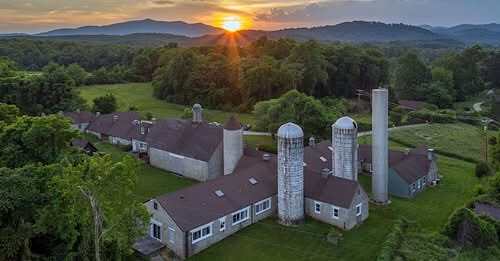 Virginia Center for the Creative Arts (Studio Barn)
Virginia Center for the Creative Arts (Studio Barn)A residency that I have been to a number of times is the Virginia Center for the Creative Arts located in Amherst, Virginia (and its second property, VCCA France, located in Auvillar, France). It isn’t that far from where I live, but I still manage to get far more work done there than I do at home. VCCA provides artists with a bedroom in very nice residence building that has beautiful communal areas, three meals a day, and a separate studio in another building for working. As it happens, this Friday (April 18), members of the VCCA Fellows Council are offering an Art Residency Application Primer to help prospective applicants understand the process better.
If you are interested in applying to VCCA or another residency, you might want to sign up for this free program.
And . . .
In a recent newsletter about words and word count in writing projects, I mentioned NaNoWriMo or National Novel Writing Month, an annual event in which writers commit to writing 50,000 words of a novel during the month of November. Only a few hours after my newsletter went out, NaNoWriMo announced that they were shutting down.I continue to post on my blog about what I read each month, and if you’re interested in that sort of thing, you can check out my reading journal.For a couple of years, I have had a feature on my blog called I’ve Got Questions in which I interview emerging writers about their new or recent books. The pace of entries in that feature has slowed, but there have been a few in recent weeks. Check them out here.That’s it for now. I hope April is treating you well.
April 15, 2025
I’ve Got Questions for Karen E. Osborne
Editor’s Note: This exchange is part of a series of brief interviews with emerging writers of recent or forthcoming books. If you enjoyed it, please visit other interviews in the I’ve Got Questions feature.
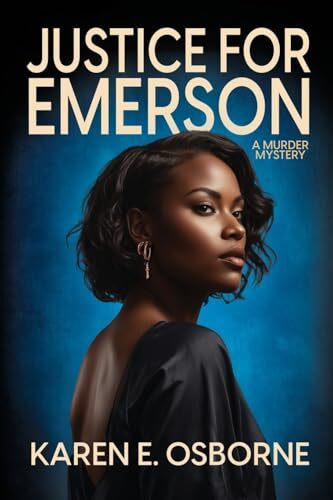 Justice for Emerson: A Murder Mystery by Karen E. OsborneWhat’s the title of your book? Fiction? Nonfiction? Poetry? Who is the publisher and what’s the publication date?
Justice for Emerson: A Murder Mystery by Karen E. OsborneWhat’s the title of your book? Fiction? Nonfiction? Poetry? Who is the publisher and what’s the publication date?Justice For Emerson: A Murder Mystery; Black Rose Writing; March 13, 2025
In a couple of sentences, what’s the book about?A murdered vet. A buried past. A CEO marked for danger. When Aria Wright finds 77-year-old Vietnam vet Emerson murdered in her nonprofit’s basement, the killer threatens her—and vanishes. As she races to protect her family and uncover the truth, the story jumps between two murders, decades apart, and the haunted life of a man whose past may be the key to solving everything. Secrets unravel and threats close in as she trusts her instincts, confronts the past, and fights for her future—even if love is the riskiest move of all.
What’s the book’s genre (for fiction and nonfiction) or primary style (for poetry)?A dual timeline murder mystery with a dash of romance
What’s the nicest thing anyone has said about the book so far?I’m so grateful for the reviews of many readers. Here’s one of my favorites: “Set against the gritty backdrop of a non-profit serving the poor and unhoused, this is the story of Aria, working to uncover the truth behind the brutal murder of a much-loved volunteer, with the help of a possible love interest who is so wrong for her, he might just be right.” –Gail Ward Olmstead, author of the Miranda Quinn Legal Twist series
What book or books is yours comparable to or a cross between? [Is your book like Moby Dick or maybe it’s more like Frankenstein meets Peter Pan?]Long Bright River by Liz Moore. It combines crime, addiction, family dynamics, and a determined female protagonist navigating a dangerous investigation. It’s especially relevant because of its themes of social justice, addiction, and redemption—core to the heart of Justice For Emerson. Before She Knew Him by Peter Swanson–dark, and suspenseful, it focuses on a woman pulled into a dangerous mystery involving murder and secrets—paralleling Aria’s peril and pursuit of truth.
Why this book? Why now?Characters speak to me. Talk about distracted driving. When they start talking, I begin writing, no matter where I am. Characters come first, then the plot. My last novel, True Grace, the one right before Justice For Emerson, is historical fiction, set in 1924. I wanted to return to writing a murder mystery (Tangled Lies was my first), but keep my historical fiction chops sharp. Finally, all my stories include romance and my protagonist, Aria, a widow since age 48, deserves to be loved again.
Other than writing this book, what’s the best job you’ve ever had?I’ve had a storied career, invited to speak all over the world about leadership, management, board building, marketing and fundraising for nonprofits, colleges, and hospitals. I’ve visited 20 different countries and 48 US states, multiple times, helping good people do urgent work, all the while working for myself, and volunteering along the way. Blessed.
What do you want readers to take away from the book?My goal is to entertain–to write novels that keep readers turning pages, gripped by both the story and characters. In addition, I lift social issues. So many of our unhoused citizens are invisible. We walk by and don’t see them. Recovering from addiction is a crushing struggle. In Justice for Emerson, I wanted to shine a light on both these issues with grace and nuance.
What food and/or music do you associate with the book?I love this question. Music plays a role throughout the novel. The dual timeline historical portion starts in 1968, and rock and roll songs provide the soundtrack for Emerson. Aria, the present-day protagonist, and a child of the eighties and nineties, has a running playlist in her head. As she goes through her day situations inspire songs. Mariah Carey’s “Hero” is one that says a lot about both Aria and Emerson – “When you feel like hope is gone, look inside you and be strong, and you’ll finally see the truth, that a hero lies in you.”
What book(s) are you reading currently?I’m enjoying The Other Princess, by Denny S. Bryce, an ARC by Nancy Bilyeau, The Versailles Formula, out April 17 and an ARC of the latest from A. J. McCarthy, Smoke and Secrets, out July 3. All excellent.
 Karen E. Osborne
Karen E. OsborneLearn more about Karen on her website.
Follow her on Facebook, Linked-In, YouTube, BookBub, Instagram, and check out her Video Podcast.
Buy the book from the publisher, Black Rose Writing, Amazon, or Bookshop.org.
April 14, 2025
I’ve Got Questions for K.J. Fieler
Editor’s Note: This exchange is part of a series of brief interviews with emerging writers of recent or forthcoming books. If you enjoyed it, please visit other interviews in the I’ve Got Questions feature.
 Shadow Runner by K.J. FielerWhat’s the title of your book? Fiction? Nonfiction? Poetry? Who is the publisher and what’s the publication date?
Shadow Runner by K.J. FielerWhat’s the title of your book? Fiction? Nonfiction? Poetry? Who is the publisher and what’s the publication date?Shadow Runner; Fiction; Black Rose Writing; June 1, 2023.
In a couple of sentences, what’s the book about?Set in an alternate Victorian England, Shadow Runner is a gaslamp, historical fantasy novel. The protagonist, Ada, born to aristocracy, is abducted and raised by a criminal society. As she comes of age, she must target the very people she once called kin or attempt a daring escape. But if she flees, she risks the lives of the two she loves most: her adopted sister and her enigmatic captor.
What’s the book’s genre (for fiction and nonfiction) or primary style (for poetry)?Historical Fantasy, Gaslamp, New Adult, Coming-of-Age, Women’s Issues
What’s the nicest thing anyone has said about the book so far?The nicest thing anyone has said about the book is some version of “I hope there’s a sequel.” I had a trilogy in mind when I wrote book one, but there is no greater motivation for an author than calls for more from readers. I’m beyond grateful and book two is on the horizon.
What book or books is yours comparable to or a cross between? [Is your book like Moby Dick or maybe it’s more like Frankenstein meets Peter Pan?]My tagline is “When Hunger Games meets Oliver Twist.” I’ve been influenced by many great authors, but humility prevents me from comparing my work to theirs. Recently, a fan compared my writing to Rebecca Solnit’s Cinderella Liberator and Waking Beauty, which was a tremendous honor. While I don’t entirely agree with the comparison, I understand why she made it. Like Solnit’s books, mine aims to challenge the myth of feminine salvation through rescue. My protagonist harbors a deep fear of becoming property and chooses a difficult life over comfort rather than losing her agency.
Why this book? Why now?Having grown up in the 60s, I refuse to stand by and watch my granddaughters be treated as anything less than equal. Activism runs in my veins, and I believe fiction is a powerful medium for driving change. Readers immerse themselves in the characters over the course of a hundred thousand words, and if one of those characters embodies the actions you wish you could take, there can be a form of quiet activism in that experience.
Other than writing this book, what’s the best job you’ve ever had?The best job I’ve ever had is being a grandmother. The rewards are unparalleled. Recently, one of my granddaughters set her tablet wallpaper to a photo of me. No amount of money in the world could ever compare to that.
What do you want readers to take away from the book?I hope to spark the imagination of young women; to encourage them to imagine themselves as heroines in their own journeys. In the words of the great poet/musician Natasha Bedingfield, “Drench yourself in words unspoken, Live your life with arms wide open, Today is where your book begins.”
What food and/or music do you associate with the book?Scones and clotted cream, with strawberry jam, and Earl Grey tea. Those are Ada’s favorites.
What book(s) are you reading currently?I just finished reading In My Boots by Amanda K Jaros, which I highly recommend. It’s an amazing story of self-discovery and perseverance. Currently, I’m reading Desulti (Spirit Song: Rebels Rising Book 2) by Ross Hightower and Deb Heim, two of my favorite authors. They create narratives of triumph in the face of adversity, showcasing strong female characters and honorable male protagonists.
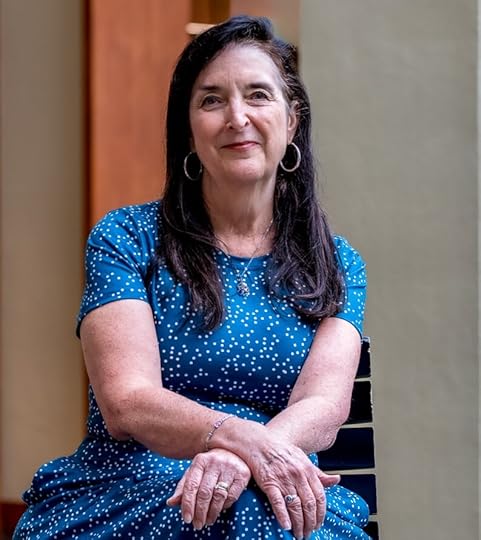 K.J. Fieler
K.J. FielerLearn more about K.J. Fieler on her website.
Follow her on Facebook and Instagram.
Buy the book from the publisher, Black Rose Writing, Amazon, or Bookshop.org
April 2, 2025
I’ve Got Questions for Nancy Christie
Editor’s Note: This exchange is part of a series of brief interviews with emerging writers of recent or forthcoming books. If you enjoyed it, please visit other interviews in the I’ve Got Questions feature.
 Moving Maggie by Nancy ChristieWhat’s the title of your book? Fiction? Nonfiction? Poetry? Who is the publisher and what’s the publication date?
Moving Maggie by Nancy ChristieWhat’s the title of your book? Fiction? Nonfiction? Poetry? Who is the publisher and what’s the publication date?Moving Maggie—A Midlife Moxie Novel
Fiction
BookBaby
Pub Date: eBook: 3/7/25, Paperback: 5/30/25
Moving Maggie is about Maggie Cartwright, a 60-year-old marketing administrator in a small hospital whose single-minded focus on her career comes at the cost of her marital relationship. Her husband’s announcement that he wants a divorce coincides with the news that her job has been eliminated, due to a takeover by a larger healthcare system. Uncertain about what she wants to do next and, with the sale of their condo, in need of a place to live, Maggie rents a home in a small rural community. A series of unexpected opportunities helps her reclaim her “Move-Ahead Maggie” identity. But her need to regain her financial stability and professional status makes her resist opening the door to personal relationships and even a possible love interest. Can Maggie find the emotional moxie to take a chance on having a life that is richer and more balanced?
What’s the book’s genre (for fiction and nonfiction) or primary style (for poetry)?Contemporary women’s fiction
What’s the nicest thing anyone has said about the book so far?“Moving Maggie offers inspiration to any woman who has found herself suddenly boxing up remnants of what she thought was a secure life and having to find a new home for her heart. Extremely relatable, and at turns funny, touching, and poignant, Moving Maggie is a story of resilience and how, if we take the reins of our lives and answer the question ‘What do I want,’ we’ll find love, friends, and new opportunities where we least expect them.” Clarissa J. Markiewicz, author of Christmas In Whimsy
What book or books is yours comparable to or a cross between? [Is your book like Moby Dick or maybe it’s more like Frankenstein meets Peter Pan?]The Ten Beach Road Books by Wendy Wax immediately come to mind, since Moving Maggie and Wax’s novels feature a diverse group of women, each with their own life challenges, who also support each other.
Why this book? Why now?If I want to get all data-y, Moving Maggie and the two previous novels in the series are responding to numbers reflecting that women account for nearly 80 percent of fiction sales in the US, UK, and Canada, and are more likely to be avid readers than men, according to Pew Research Center.
But the truth is, I wrote Moving Maggie and created the Midlife Moxie Novel series because I wanted to read more books featuring middle-aged women. And they say you should write what you want to read.
And when I talk to women at my book signings, I hear the same thing over and over: they want books about women like them who are dealing with the same issues they are: empty-nest-itis, retirement (theirs or their partners), loneliness, health challenges, financial setbacks, a desire for a new life, a new career, a new something!
So I wrote these novels with that in mind, making sure I also included a secondary storyline showing the importance of female friendships.
Other than writing this book, what’s the best job you’ve ever had?Well, since I’ve always been a writer and since this is my tenth book, I’d have to say that writing in general is the best job I ever had and the only thing I ever wanted to do.
What do you want readers to take away from the book?My goal with Moving Maggie and the Midlife Moxie Novel series in general is to show women that being 50 or older doesn’t mean they’ve reached the end of the road and it’s all downhill now. Rather, I want my novels to reinforce the belief that life can still be full of possibilities and it’s up to midlife women to make the most of those options. Hopefully my characters will inspire them to find their own inner moxie and pursue their dreams.
What food and/or music do you associate with the book?Hmmmm… If you asked this about Finding Fran (the second in the series) it would be chocolate, while for Reinventing Rita, the first novel, it would be any baked goods. For Moving Maggie, I would have to say coffee. Maggie (like me) is a definite caffeine lover!
What book(s) are you reading currently?Since I write book reviews, I have a never-ending stack of books to read. I am working my way through two memoirs plus How we learn to be brave : decisive moments in life and faith by Mariann Edgar Budde, and there’s a novel coming my way via mail! My TBR pile is getting bigger and bigger and bigger…
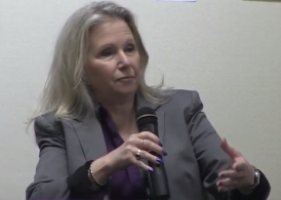 Nancy Christie
Nancy ChristieLearn more about Nancy on her website.
Follow Nancy on Facebook and X/Twitter.
Buy the book from BookBaby, Amazon.com, Bookshop.org, Barnes & Noble, or Books-a-Million



